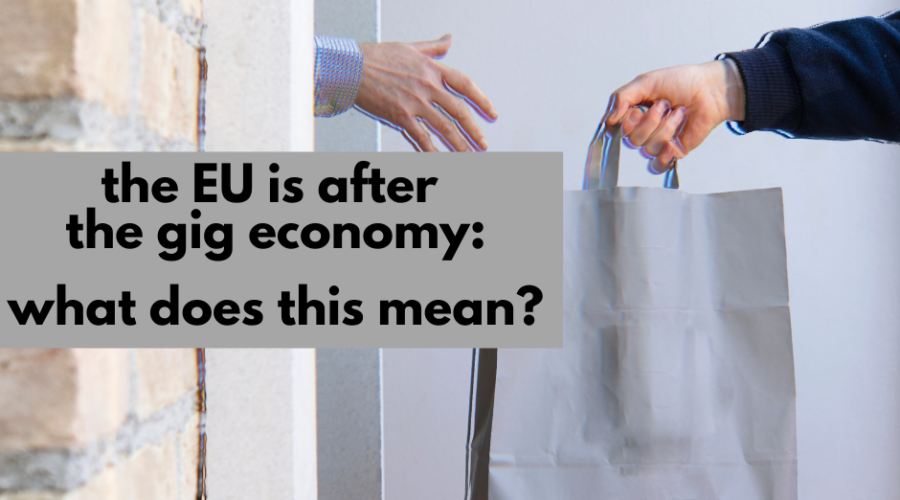The EU is after gig economy: what does this mean?
Recently, the European Commission published draft legislation, planning to regulate the employment status of gig workers across the bloc. There have been multiple attempts of defining worker rights and status at the country level, with contradicting court decisions, and it seems like the EU commission wants to take matters into its own hands.
Sharing economy is a platform-based type of exchange that allows individuals and groups to share their services peer-to-peer. Platforms only act as intermediaries and facilitators, instantly connecting the supply with demand, but not everyone sees sharing economy platforms in this way. Ride-hailing and delivery services have come under fire for treating drivers and delivery workers as contractors. The EU Commission and a few member states such as The Netherlands say that they should be given the employers’ rights.
This EU initiative has received different reactions. While unions found a reason for celebration, ride-hailing and delivery platforms rally against it. Uber and Delivery Platforms Europe, the group of food delivery platforms, voiced their concerns about the impact this initiative will have on consumer choice and the thousands of jobs it threatens. Changing the business model may not be feasible for all the companies, as it could force them out of some EU markets. According to a recent study, up to 250,000 couriers could quit if legislation reduces flexibility around working hours and schedules. This has already happened with Deliveroo and Spain. After a new Spanish “Rider Law” entered into the force in August, the company had to cease all operations and 8,000 couriers ended up losing their jobs.
The contractor status gives drivers flexibility and the chance to choose their working hours. In our fast-changing world, that is especially appealing. Furthermore, with the increased risk of getting laid off as a result of another lockdown, engaging in the gig economy lets Europeans diversify their income sources. They can work for different ride-hailing apps simultaneously, which would be impossible in the case of full employee status. It also allows those drivers to mix various engagements and find which one works best for them. A 2018 study of Uber drivers in London demonstrated that flexible schedule, along with autonomy was the main benefit for them, while another study found that being an independent contractor is associated with “greater enjoyment of daily activities, a decrease in psychological strain”.
Delivery drivers are no different, two-thirds of respondents of a study by Copenhagen Economics name flexibility as the main reason for working as a courier and over 70% of them wouldn’t be willing to switch to fixed-schedule work.
For workers, the draft legislation would mean a loss of flexibility to decide their working hours and the ability to work for several platforms simultaneously. For European consumers, these changes would mean a hike in sharing economy services prices, which they have been relying heavily on during the pandemic. This can lead to decreased demand for food delivery services, and in the light of current lockdowns and restrictions, the restaurant business also ends with the short end of the stick.
One size doesn’t fit all: some prefer using traditional taxi services, others are more comfortable with ride-hailing apps. Just because taxi drivers are faced with substantial licensing fees that drive up the cost of the service, doesn’t mean we should overburden ride-hailing platforms with the same regulations and restrictions. If European governments want to create a level playing field, they should make things easier for taxi drivers and gig workers, as happened in the case of Estonia. The Estonian government legalized the sharing economy “at a time when a large part of the world is finding protectionist reasons to prohibit the sharing economy” and lessened previous regulatory burden on taxis. The Estonian government didn’t try to cover employment status and rightly so, as according to recent polls 76.4% of platform workers in Estonia use the gig economy to supplement their income.
Consumer habits have changed and even after the pandemic is finally over, it is likely that we will keep ordering food from the comfort of our own homes. These platforms provide unique value to millions of consumers around Europe. If we transfer the exact rules and regulations traditional services are faced with —as the EU Commission intends to do—we risk losing everything that makes the sharing economy unique and attractive. Consumers are the ones who will have to bear the burden of restricted choice and increased prices.










